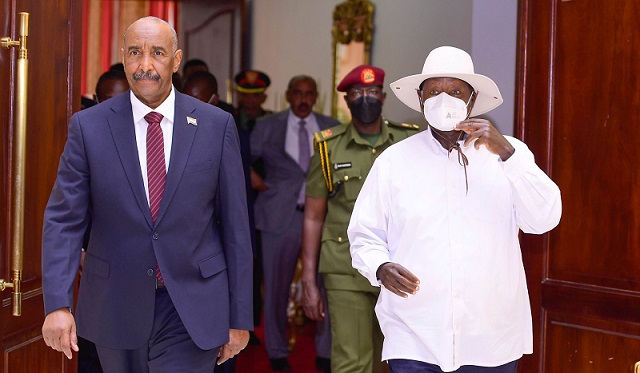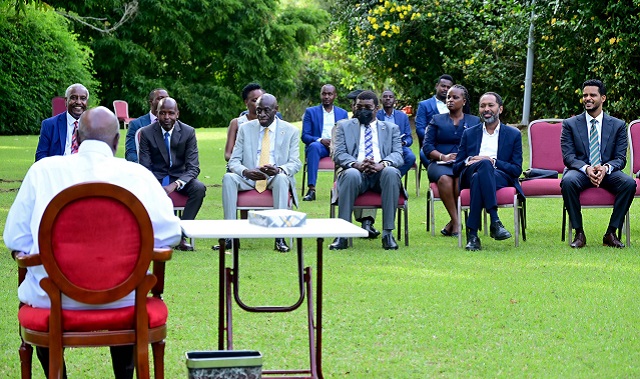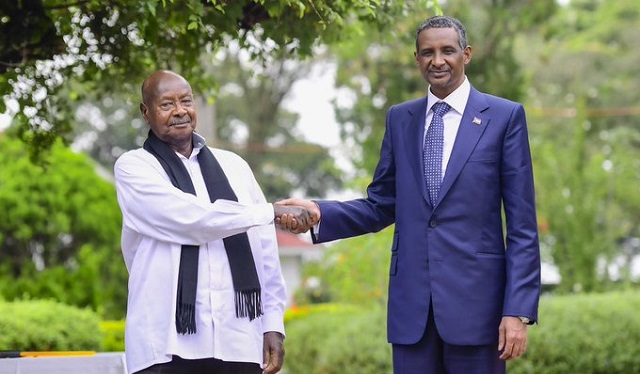
Fears over continued fighting as Gen. Burhan rubbishes IGAD talks
COVER STORY | IAN KATUSIIME | Sudanese Army Commander-in-Chief Abdel Fattah Al-Burhan has once again put President Yoweri Museveni in a quandary.
On Jan.30, just as a 14-day window for direct talks between Gen. Burhan and his challenger for the presidency Gen. Muhammed Dagalo commander of the break-away Rapid Support Forces (RSF), was closing Days to the expiry of a deadline Museveni mediated, Burhan has vowed to resume fighting.
President Museveni on Jan. 18 hosted several heads of the Horn of Africa, Nile Valley, and Great Lakes regions that comprise the Intergovernmental Authority on Development (IGAD) to review the situation in Sudan and repeat its demand for face-face talks between Gen. Burhan and Gen. Dagalo.
The IGAD meeting chaired by Ismail Omar Guelleh, President of the Republic of Djibouti, who is the current chairperson of the IGAD, ordered Burhan and Dagalo to hold face-face talks within 14 days.
Instead on Jan.30, while addressing his troops at the 11th Infantry Division headquarters and the 44th Brigade in New Halfa, Burhan pushed aside the Museveni brokered push for dialogue and vowed to crush Dagalo’s rebellion.
“We are not interested in wasting time with talks. We must move forward and continue our fight against this rebellion,” Burhan reportedly said, according to the Sudan Tribune.
Although there were reports that representatives of the both sides held talks under a different arrangement in Bahrain, an island nation in the Middle East, the news was neutered by the bellicose remarks of the Sudanese army chief who is officially referred to as the chairman of the Transitional Sovereign Council of Sudan.
Burhan’s declaration came as a blow to the IGAD-led mediation that seemed to have picked momentum as the year ended and Museveni’s attempts to mediate the fighting in the country seem to have hit a dead end.
Instead of anticipated peace dialogue, there is now potential for more outbreaks of violence.
For Museveni who hosted the IGAD talks at State House Entebbe, it is a diplomatic setback as he has been carrying out victory laps after hosting a summit of the Non-Aligned Movement (NAM) that convened some major leaders like the presidents of South Africa, Ghana, Zimbabwe, the prime minister of Ethiopia and the UN Secretary General Antonio Gueterres.
The IGAD summit on the situation in Sudan was held at the same time as the NAM meet. Heads of state of IGAD members Sudan, Uganda, Kenya, Somalia, South Sudan, and Djibouti attended. Only Ethiopia and Eritrea were absent.
Moussa Faki Mahamat, the Chairperson of the African Union (AU) Commission and Ramtane Lamamra, Personal Envoy of the UN Secretary General for Sudan also attended together with delegations from Saudi Arabia, UAE, Egypt, the European Union, the UN, and the USA.
But in a sign of the trouble that lay ahead, Gen. Dagalo was invited for the IGAD talks and his nemesis Gen. Burhan was left out. But even before the January IGAD summit, Dagalo separately met Museveni, Kenyan President William Ruto, and Ethiopia’s Abiy Ahmed. He was also in Kigali where he visited the Genocide Memorial although he did not meet President Kagame.
Those observing from a distance interpreted the charm offensive from Gen. Dagalo as a sign of the shifting balance of power from the Sudanese Army Chief onto his subordinate-turned-rival.
The call to arms by Burhan means that Museveni and other regional leaders will have to change their calculus and possibly keep a distance from Dagalo in order not to provoke the Sudanese army chief.
The decision of the eight member bloc to invite Dagalo, Commander of the Rapid Support Forces (RSF) to attend the Heads of State summit in Kampala drew anger from many who accuse him of being a war criminal that carried out a genocide in Sudan’s Darfur region.
“They are treating him like a head of state and giving him all this attention,” Dallia Abedlmoniem, a Sudanese political analyst said of IGAD while speaking to the BBC on Jan. 17.
IGAD problem
As leaders in the region work out a plan, there is another problem. With the escalation of the conflict in Sudan likely, analysts are calling out IGAD in the middle of its mediation efforts, questioning its impartiality as well as its credibility. The closeness of IGAD leaders to Gen. Dagalo proved problematic to the negotiations and his presence at the IGAD summit seemed to have made matters worse.

History shows that IGAD has always had a problem in mediating conflicts because some of the heads of state in the bloc are either seen to be too close to the actors or have special interests. Museveni, the longest serving leader in the IGAD bloc, has always faced this criticism.
During negotiations for the landmark peace agreement of South Sudan was signed in 2018, research carried out by the International Refugee Rights Initiative (IRRI), an organisation formed to inform and improve responses to cycles of violence and human rights violations, revealed that South Sudanese citizens had lost trust in IGAD.
South Sudanese accused IGAD of preferential treatment towards the government of Salva Kiir and a failure to apply pressure on him to adhere to the peace agreement. The criticism was believed to be aimed at Museveni for his closeness to Kiir.
The research titled “Dialogue and Peace Agreements in South Sudan” says IGAD did nothing when Machar was detained in South Africa in 2017. The study said IGAD did not follow up on other provisions in the 2015 agreement.
The research published in November 2018 said some members of IGAD particularly Uganda and Kenya were not impartial- they were on the side of Kiir’s government because of business interests.
At the height of the fighting in South Sudan that broke out in 2013, IGAD officially asked Uganda to withdraw its troops from the nation. Uganda had deployed in 2013 to deescalate fighting but it was accused of trying to save President Salva Kiir. IGAD’s pleas fell on deaf ears and Ugandan troops stayed and left on their own volition which left a marker for what future IGAD-led efforts would look like.
South Sudan trouble
The Sudan conflict that broke out in April 2023 has killed over 12000 people, displaced 9 million and created tension in the region with unstable states like South Sudan and Somalia.
Throughout 2023, Museveni was involved in several efforts aimed at resolving the conflict in Sudan. In September, he met Burhan at State House and the two were beaming in photos. It was the first time the two were meeting since the fighting started.
In May, Museveni chaired a virtual meeting of the African Union Peace and Security Council, on the situation in Sudan. “As I had reiterated earlier, Sudan does not belong to the army or the RSF, it belongs to the People and therefore I call upon the immediate cessation of hostilities to allow the people elect their leaders,” Museveni said in a statement.
He added, “This business of how to integrate armies is not new, we have done it in many parts of Africa including here in Uganda, it cannot be the reason for starting such a devastating war.”

Two months later, Museveni received a delegation of civil society and political leaders from Sudan to forge a way forward. The group advocated for the African Union and IGAD to lead negotiation efforts. This meeting is what led to the Extra Ordinary Summit of Heads of State in January.
However even in 2019 after the overthrow of Gen. Omar El Bashir who had ruled the country for thirty years, Museveni was the first point of call. Gen. Burhan already installed as the country’s Transitional Leader met Museveni with his delegation over making peace.
With no path in sight for finding peace, there is concern over what continued fighting in Khartoum could mean for South Sudan which has struggled to find peace since it broke away from Sudan in 2011. It presents a bigger puzzle to Museveni who has also been trying to keep South Sudan stable.
In 2022, President Museveni attended the first graduation of the Unified Forces of South Sudan which was seen as a sign of progress for what was long considered an army divided on ethnic lines. Museveni was invited by President Salva Kiir to attend the ceremony where over 20,000 South Sudan graduates were passed out in a highly anticipated ceremony that was years in the making.
The event was held at the Dr. John Garang Mausoleum in Juba, capital of South Sudan. Garang was the leader of Southern Sudan before it seceded from Sudan in 2011 to become a sovereign state, South Sudan. Garang died in a mysterious chopper crash in 2005 and Kiir, his deputy, took over as leader.
“I am here to show our solidarity and happiness about what is happening here today,” Museveni said in his speech. “To see the United Force of the people of South Sudan making a nucleus of a new national force, I thank you so much,” he said.
Media reports said the 20, 000 forces included VIP protection forces, police forces, national security services, prison services, wildlife services, and civil defense forces. President Kiir made his pledge of peace to the new national force.
Observers in the region have expressed fears over possible spillovers to South Sudan should the fighting go on unabated in Sudan.
 The Independent Uganda: You get the Truth we Pay the Price
The Independent Uganda: You get the Truth we Pay the Price



